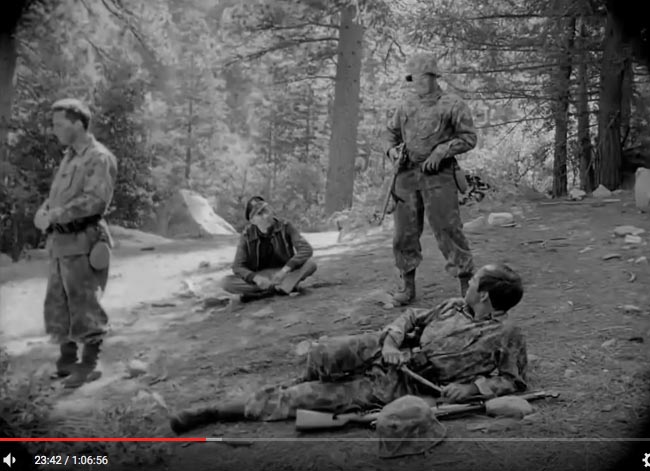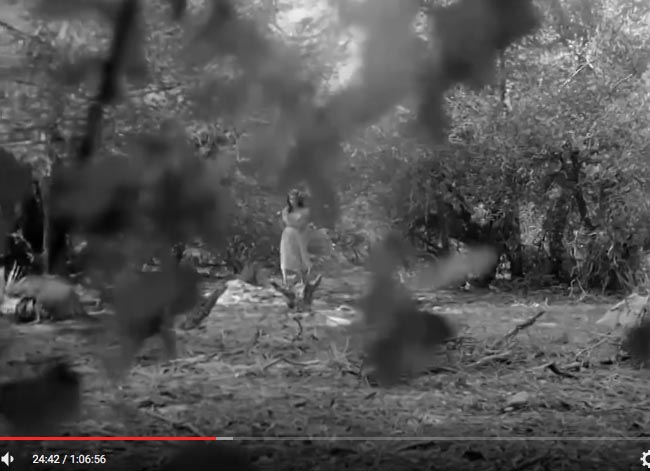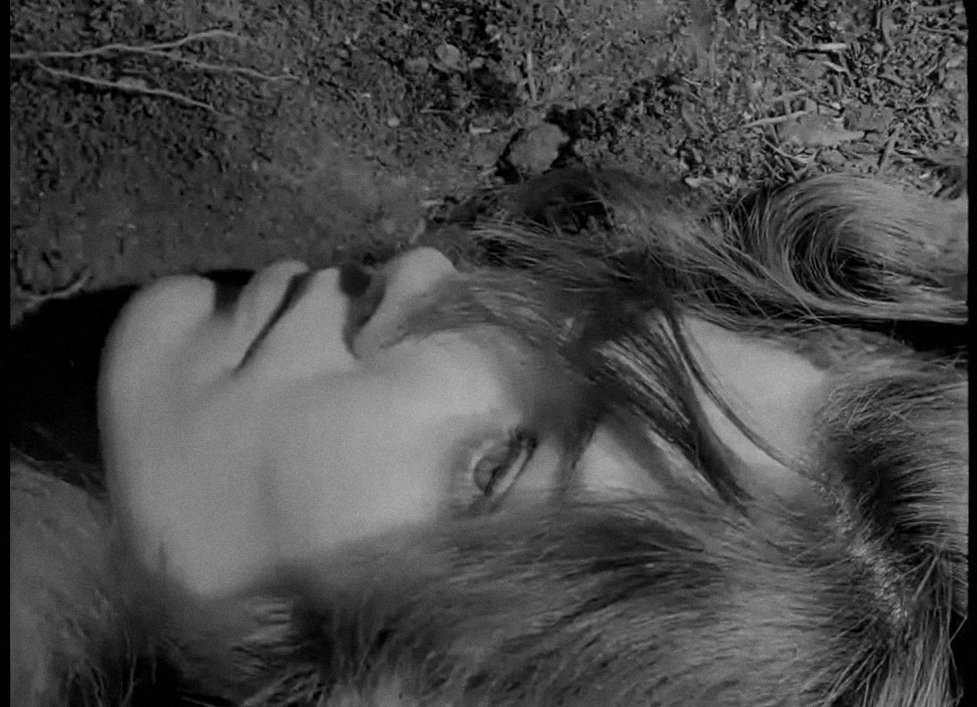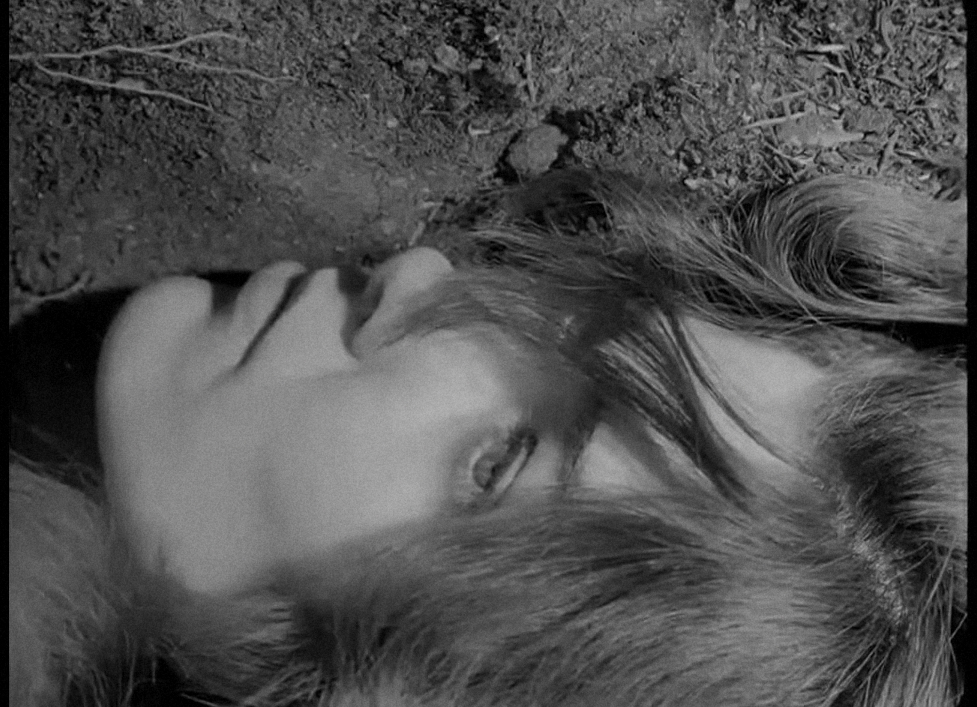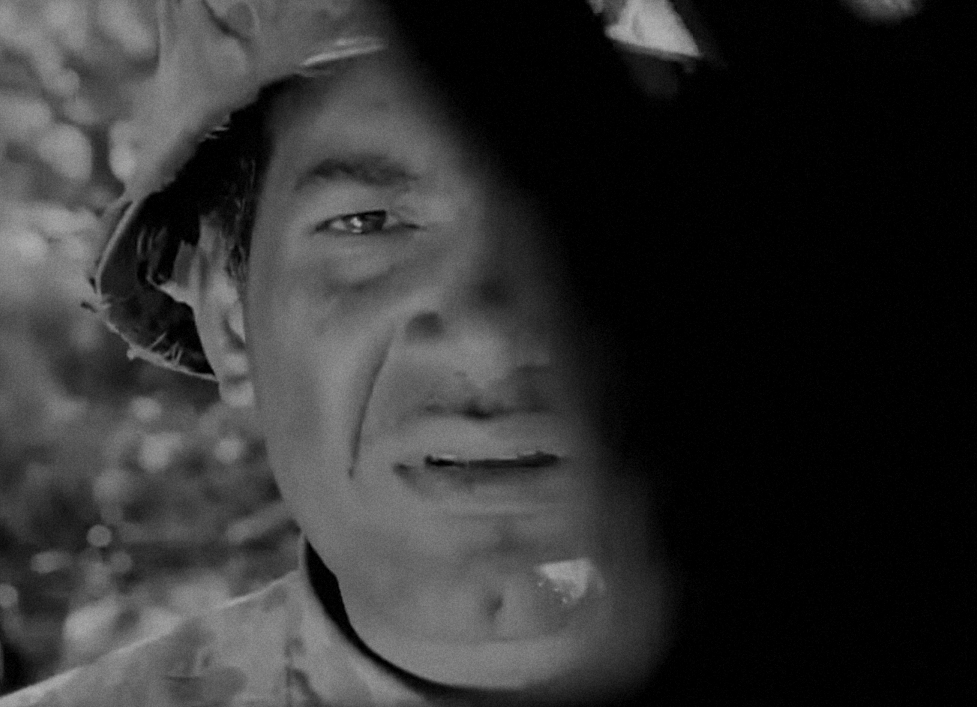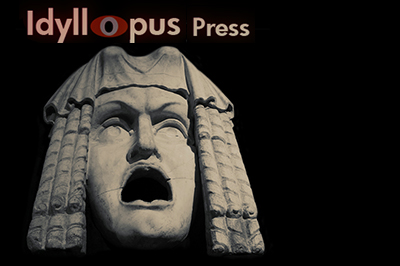STANLEY KUBRICK'S FEAR AND DESIRE

Go to TOC for this film ( (which has also a statement on purpose and manner of analysis and a disclaimer as to caveat emptor and my knowing anything authoritatively, which I do not, but I do try to not know earnestly, with some discretion, and considerable thought).
DAY TWO
TOC and Supplemental Posts | Part 1 | Part 2 | Part 3 | Films Home
Links to sections of the analysis on this page:
The Decision to Return to the Raft: Shots 228 through 243
Notes on The Decision to Return to the Raft: Caliban and the cannibals. Corby versus Mac as Prospero versus Caliban.
The Capture of the Woman Shots 244 through 316
Notes on The Capture of the Woman: Defining the characters of the men in respect of their treatment of the woman. Prospero versus Caliban and the hypocrisy of civilization. Breaking of the fourth wall. Communicating with signs rather than language. Sidney's flood of memories represent through flashback overlays.
The Woman Killed by Sidney Shots 317 through 474
Notes The Woman Killed by Sidney: The Tempest, chess, and HAL's error. Sidney as Ariel and his fear of being left behind. The death of the woman and its similarity to the deaths of the three soldiers the previous night. Metamorphosis, illusion, and why Sidney denies responsibility for the woman's death, instead asserting the magician, Prospero, is in control. The woman, free will, Comus, and the error that requires the calling upon Sabrina as a goddess who holds the power of reversals. Theater, the illusory, and magic. Sidney's tale of metamorphosis and the story of Taliesin. Metamorphosis, the mystery of what's in the woman's hand, and its relationship to what's in Jack's hand in The Shining. The dog, Proteus, and the protean nature of Kubrick's characters, settings and props. The Two Gentlemen of Verona and its relationship to the protean Sidney, and the question of one's true face. Mac's speaking of the rifle sight and the red eye, its relationship to the mouse-trap and to 2001. Examining the film in respect of The Tempest does not negate those layers of the story that speak to the horrors of war.
THE DECISION TO RETURN TO THE RAFT
228 MC to LS of Fletcher, Corby, and Sidney resting on the ground, Mac standing beyond. Daylight. Fade in.
229 MCU Corby. Sound of distant artillery.
230 CU of Mac.
231 Return to shot 228.
FLETCHER: We're in a fine mess now!
232 MCU of Sidney lying on the ground, his eyes closed. He opens them as we hear Mac pacing.
FLETCHER (off screen):
I'd give anything to trade places with that dog we chased yesterday. Seems like whenever people get in a hole they begin to get jealous of dogs.
233 MS Corby sitting, Mac standing beyond.
CORBY:
I admit that our prospects aren't very cheerful. But how about going back to see if our raft is still there?
234 CU Mac.
MAC: Look, if we were spotted, they'll have a trap waiting for us when we show up.
CORBY: Well, it's a chance. Trying to walk out is as risky today as it was yesterday.
235 MS Sidney lying on the ground, Mac standing beside him.
CORBY:
We'll scout around the river and make certain.
SIDNEY (sitting up): Then, what? Even if we find the raft there, even if none of them
is waiting for us, then what?
The camera has panned over with Sidney as he moves closer to Corby, Fletcher now in the background.
CORBY: Then, we have to sit tight until it gets dark, and hope that we don't have a full moon. We can sing old songs if we get restless waiting.
236 Sidney stands, Mac beyond.
MAC (teasing Sidney):
What's the matter, snookums?
237 MS of Sidney from beyond Mac.
MAC:
I heard that they're cannibals, so even if we get caught you're pretty safe.
Mac grabs and kneads Sidney's stomach as if to indicate he's too skinny to eat.
SIDNEY (pulling away): Leave me alone!
238 MS of Mac laughing.
CORBY (off screen): We may be in the woods, McClellan, but let's try to remain civilized.
239 CU of Corby looking stern. He glances from Mac to Sidney.
240 MS profile of morose Sidney.
241 Return to shot 231, LS of Sidney standing to the left now, Fletcher lying down in the foreground still, Corby seated beyond and Mac standing.
MAC: Yeah, I suppose you're right, Lieutenant. Anyway, there won't be many days left to be civilized in if we stick around these woods much longer.
242 MS Corby. Crossfade to them walking along a path through the woods.
243 LS of the men walking a path in the woods toward the camera. Corby trips on a branch.
THE DECISION TO RETURN TO THE RAFT: THINGS TO NOTE
Caliban and the cannibals. Corby versus Mac as Prospero versus Caliban.
This scene transitions the soldiers back to the raft, but is largely used for setting up the following scene of their taking a woman captive with Corby's insistence that they remain civilized.
Sidney's deteriorating mental state may be observed in his silence and dissociation from the group, but there is little to help prepare us for the gymnastics that are to come.
The characters of Corby and Mac continue in their alignment with Prospero and Caliban, Prospero urging that they remain civilized and himself representing civilization while Caliban is closer to nature. However, in the next scene, the question will be raised as to what exactly does it mean to be "civilized", just as in The Tempest the character of Prospero believes himself to be one thing, a person of right and good, but eventually must realize his own darkness. With the capture of the woman, Corby's character will prove especially troubling.
Mac's mention of cannibals is a reference to Caliban whose name is original to Shakespeare and is thought to come from the word "cannibal". Shakespearean researchers have no problem with permutations.
Note to myself. One wonders why Kubrick kept shots of Corby tripping over branches. Was it a personal thing? Does it have to do with instead increasingly presenting Corby as foolish? Demeaning him? Does it somehow have to do with Prospero exerting his authority and will over Caliban then Ferdinand by demanding they collect wood? Did Kubrick not like the actor and let off a bit of steam against him this way?
THE CAPTURE OF THE WOMAN
244 LS of the river, same as 99.
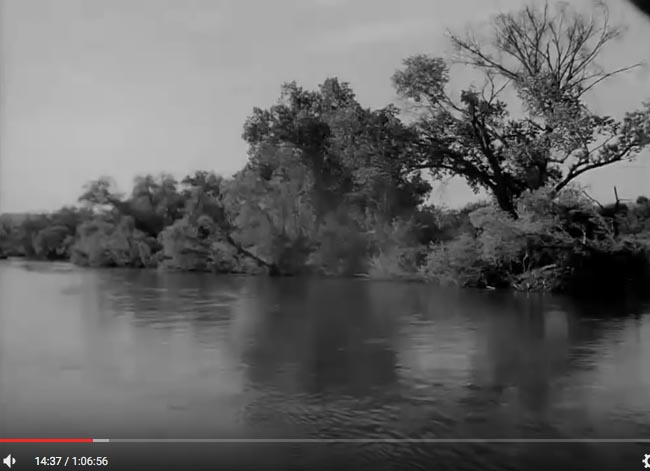
245 MS to LS of 3 women in the river fishing.
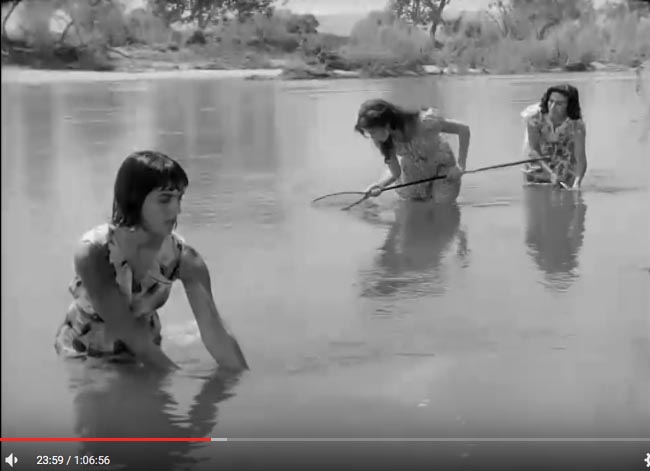
246 MLS from side of Corby climbing a hill to the left, Fletcher, Sidney and Mac following.
247 MS of the woman (played by Virginia Leith) now sitting on the bank of the river, her two companions still in the water fishing. The woman is slipping on her shoes. She stands, a fish in her net, and begins walking away.
248 LS of Corby, Fletcher, Sidney and Mac coming down a hill. Corby again almost trips. They stop and he looks like he's pondering which way to go. Then he looks left off screen.
249 LS of the woman advancing in the distance, glimpsed through the leaves of a tree.
250 LS of Corby, Mac, Fletcher and Sidney rushing to hide behind some bushes.
251 CU of Mac's eyes through the bushes.
252 CU of Sidney watching through the bushes.
253 LS as 249, the woman coming closer.
SIDNEY (off screen): She'll see us!
MAC (off screen): Shut up!
254 as shot 252, Sidney watching.
255 CU Sidney's right hand pressing against a twig and it snapping.
256 LS through the bushes of the woman, having passed, stopping. She turns and looks back.
257 CU of Sidney's hands brushing at the twig. I don't know why.
258 as shot 254 of Sidney watching.
259 LS of the woman through the bushes, she advancing. She stoops to look more closely.
260 CU of Mac's eyes as in shot 251. He is looking off slightly to screen left and then looks directly at the viewer.
261 LS of the woman still advancing. When she is quite close the camera pans down to her lower legs and shoes.
262 MCU of the woman looking in the bushes.
263 CU of Mac's eyes as in shot 260.
264 MCU of the woman looking in the bushes as in shot 262. She sees Mac.
265 MS Mac lunging out of the bushes to grab her.
266 MS from the side of Mac grabbing the woman and covering her mouth.
267 MS of Sidney, Corby and Fletcher rising from behind the bushes.
268 CU of Mac with his hand over the woman's mouth.
269 Sidney, Corby and Fletcher advance from behind the bushes.
270 CU as in shot 268, the woman looking as the men advance.
271 MLS of the men surrounding the woman.
CORBY (brushing the side of her face and hair): Don't be afraid, we're not going to hurt you.
272 CU of Mac holding the woman, as in shot 270, Corby's hand brushing her face as she tries to draw away.
CORBY: She's quite nice. Don't you think so, boys?
FLETCHER (off screen): Well, what are we supposed to do with her now? I've got a wife at home.
CORBY (off screen): I'm afraid she's become our unvited guest. I must say I've had worse guests at better parties.
273 CU of Corby smirking.
274 MS of Mac holding the woman.
MAC (taking up for the woman): All right, Corby, all right. Let's not forget where we are. "Even if we're lost in the woods let's try to remain civilized."
275 MS from opposite side of Mac holding the woman, Corby on the right. We are behind Fletcher in the foreground, his back to us.
CORBY: Well, we can't stay here.
276 CU of Mac holding the woman.
277 as in shot 275, Corby turning and walking away. All follow.
FLETCHER: Shall we leave her fish here?
CORBY: There'll be plenty.
Fade to black.
278 Fade in to MLS of Mac still holding the woman, Corby standing to screen left next to a large tree, Sidney and Fletcher to screen right.
SIDNEY: What are you gonna do with her, Lieutenant?
CORBY: Give me your belt. You too, Fletcher.
Fletcher begins to remove his belt.
SIDNEY: Please, don't beat her. She's just scared like we are.
279 MCU of Mac holding the woman, smirking or smiling.
SIDNEY (off screen): She doesn't even talk.
CORBY (off screen): Get a grip on yourself, no one's gonna...
280 CU of Sidney.
CORYBY: ...punish her. I simply wanna tie her up.
281 CU of woman.
CORBY: Now give me your belt.
282 CU of Mac holding the woman as in shot 279.
MAC: Let's hurry it up. My arm's getting tired.
283 CU of woman's face as in shot 281.
284 MCU of Sidney advancing toward the woman and Mac, then Fletcher. Mac, Fletcher and Corby tie her to the tree.
SIDNEY: Be careful not to hurt her.
285 LS of Mac, Fletcher and Corby tying the woman to the tree.
286 CU of Sidney's face.
287 MCU of the woman before the tree, the men still tying her to it.
288 MCU from behind Corby of him finishing tying the woman and moving to stand before her.
MAC (off screen):
I hope she doesn't start screaming.
289 CU of the woman, having been released by Mac, her mouth uncovered.
290 MS of Corby, Mac and Fletcher standing before the woman, from behind her.
CORBY: She's a pretty little thing.
FLETCHER (looking at Corby like he's worried about what he might do to the woman):
Why don't we just leave her here and get going?
291 CU of the woman as in shot 289.
CORBY: Don't rush me. If we can make her understand us, perhaps she can tell us whether they found the raft.
292 CU of Sidney.
SIDNEY:
You speak Spanish? Habla espanol?
293 MS Corby, Mac and Fletcher from behind the woman, as in shot 290. Corby and Mac look at Sidney like he's absurd.
CORBY:
I'll handle it, Sidney. I'm quite sure she wasn't educated abroad.
294 CU of the woman as in shot 291.
CORBY (off screen): Now, see...
295 CU of Corby speaking to the camera, Mac and Fletcher beyond.
CORBY: You - see - boat? Our - boat?
Corby points at her (us), then points to his eye, but then hasn't a clue what to do for the word "boat", so he just heavily enunciates it, as if this will make her understand.
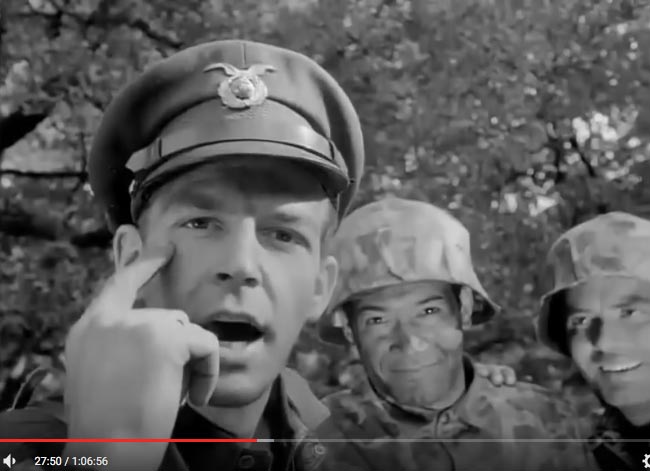
296 CU of the woman.
THE GIRL (trying to pronounce the word): Boat?
CORBY (off screen): Yes, that's it. Boat.
297 as shot 295.
CORBY: You - see - boat?
298 CU of the woman as in shot 286. She stares mutely.
299 MCU of the woman from behind and between Mac and Corby.
MAC (mocking Corby): Don't tell me she doesn't even understand...
300 LS of the woman tied to the tree, from the side, and the men before her. Corby walks off to screen left and the men follow.
MAC: ...you.
301 CU of the woman as in shot 298.
302 LS of the men from the same angle as shot 300.
303 CU of Sidney from the side.
SIDNEY:
If she can't tell us anything, let's let her go.
MAC: Sure...
304 MCU of Mac from beyond Sidney.
MAC: Sure, so she can run downstream to that command post and tip our hand.
305 CU of the woman as in shot 301.
MAC (off screen): You kids and your ideas.
306 MS of Mac, Sidney and Corby.
CORBY: Maybe she was going there in the first place.
307 MCU of Fletcher.
FLETCHER: With the fish, you mean?
308 MCU of Mac from beyond Sidney.
MAC: Sure. A general gets what he wants for dinner, no matter what.
If it's fish cod or fresh strawberries
or gold plates...
CORBY (speaking over):
This is hardly the time to become a revolutionary.
309 as in shot 306.
CORBY: We ought to continue to see about the raft, but we can't let her go yet.
SIDNEY: Why? What she'd do to us? If she could understand she would have told you.
CORBY: Mac already told you why. Sidney, you'll stay here with the young lady until we come back. Here, take this.
Corby holds out his gun to Sidney who stares at it.
SIDNEY: You're gonna leave me here?
CORBY:
Yes, I told you, to watch the woman.
SIDNEY: You're gonna make me stay and then not come back.
I know because of...
310 MS of Mac and Sidney from behind Corby's shoulder.
SIDNEY: ...yesterday.
MAC:
Keep calm, kid! If we're not back by night just get in touch with her old man about a wedding.
He winks at Sidney.
311 CU of Sidney.
MAC:
Maybe you can settle down in a treehouse and raise some monkeys.
312 Shot as 310 of Mac laughing.
FLETCHER (off screen):
Leave him alone, Mac.
313 CU of Sidney as in shot 311.
SIDNEY: Don't listen to him. Remember, you promised to come back, Fletcher.
314 MS of Mac, Sidney and Corby as in shot 309.
CORBY:
I want you to stay here and keep an eye on her, because she may prove very useful if the raft has been discovered. (Looks at watch.) We ought to be back in a couple of hours.
Now, just relax. (He places the gun in Sidney's hand.) Don't get panicky.
Mac and Corby walk off screen left.
FLETCHER (off screen):
See you later, Sidney.
Music begins as Sidney looks after them.
As he holds the gun and looks down at it, an overlay of Fletcher and Mac rushing the men in the cabin, shot 166.
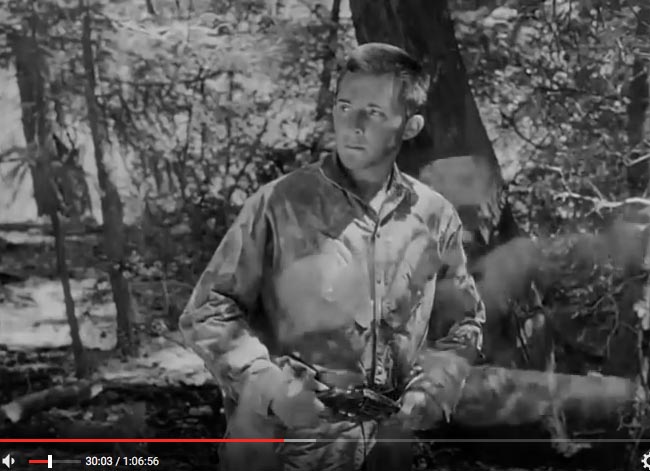
Then an overlay of the men in the cabin turning to face them, as in shot 167.
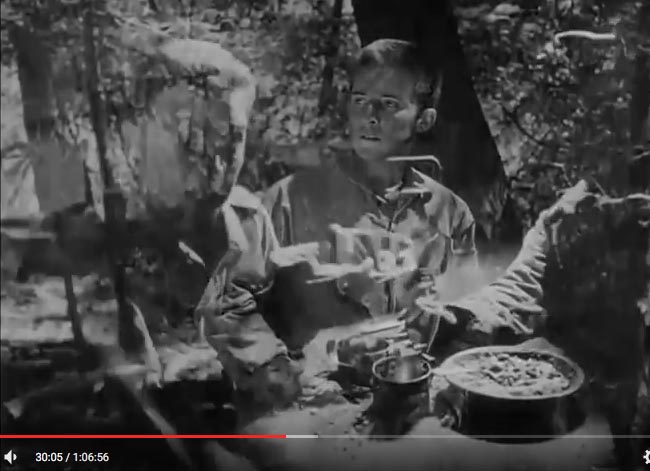
Overlay also shots 168, 169, 170, 171.
315 CU of Sidney is now switched in under the overlays, the shift barely noticeable.
Continue overlays of shots 172, 173, 174, 175, 176, 177, 178.
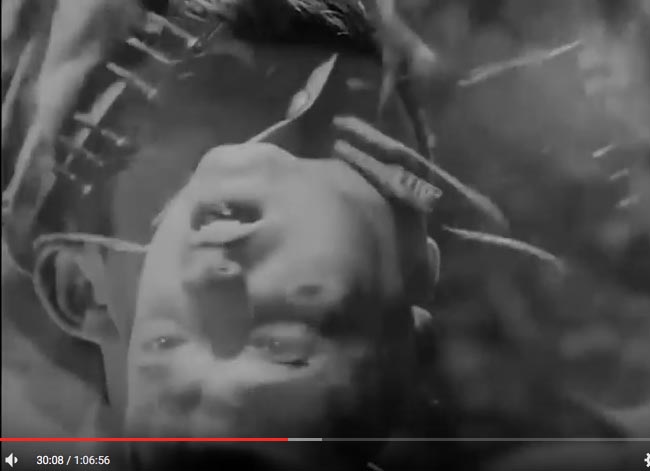
316 MS of the woman tied to the tree, Sidney sitting beyond is now crossfaded in under the CU of Sidney as well as the continuing overlays, the shift again barely noticeable.
Continue overlays of shots 179 and 180, perhaps even 181.
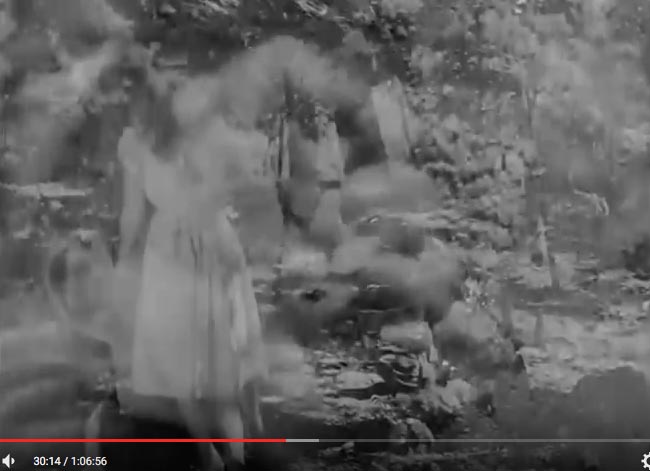
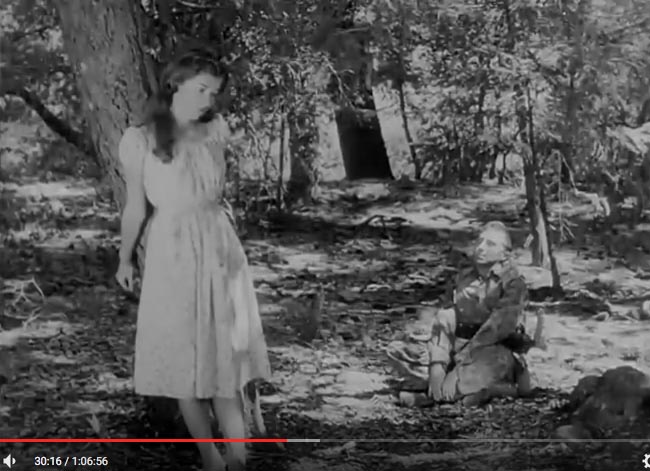
THE CAPTURE OF THE WOMAN: THINGS TO NOTE
Defining the characters of the men in respect of their treatment of the woman. Prospero versus Caliban and the hypocrisy of civilization
As far as character development, we learn a good deal more of the men here through their treatment of the woman. Corby, the commissioned officer, who had just expounded on remaining civilized, seems the most potentially dangerous to her sexually, and his remarks unsettle the others. Mac may joke with Sidney about settling down with her but his view on the woman is much the same as Fletcher's. She is potentially dangerous because she has seen them and needs to be kept quiet until they are out of danger, that is all. They aren't interested in harassing her.
Caliban, in The Tempest, is presented as uncouth, dangerous. He even is given as having attempted to rape Miranda, Prospero's daughter. But the noble Prospero is one who has enslaved Caliban and treats him cruelly with his magic, not having the physical power to contain him. Corby, representing authoritarian, "noble" civilization and the powers of Prospero, is cruel to the woman. Mac, who is aligned with Caliban, sympathizes with her and reminds Corby of his earlier insistence they remain civilized despite being in the woods, pointing out that his behavior is instead base.
But then the woman bears a certain comparison with Caliban. A woman of this enemy territory, she is much like Caliban was when Prospero arrived and took his land. Prospero taught Caliban to curse, whereas Miranda taught Caliban to speak, so it is interesting that the woman here is mute, speechless, not comprehending their language. This is her place, her home, just as the island was Caliban's. What makes Caliban and Miranda alike is that after the age of three Miranda had no acquaintance with people other than her father and Caliban, so that when she sees Prince Ferdinand he is a surprise to her (a young man!) and she believes him the most wondrous creature she's ever beheld. Though Prospero's machinations have the ultimate goal of returning her to Italy where she will resume her noble role,with an upgrade, and though she spent her first three years in Milan, the island is her home, just as it is Caliban's. Other than having a few vague memories of her nurses when she was young, her experience is of the island. It is all that she knows. As for Caliban, the island is all that he has ever known, and, aside from his mother, he has never met another female aside from Miranda. He had wanted, by raping her, to have children with her that would populate the island as their heirs.
The shots in which she is watched by Mac, and in which she sees him through the leaves, stand out for their beauty and liveliness. They also make a connection between the woman and Mac (as Caliban) as Kubrick focuses on Mac as the one who watches the woman through the thicket, and it is Mac who the woman first sees. As I've noted earlier, she is also a fisherwoman, and Caliban, in the play, is described as seeming sometimes to be part fish, having fins. It makes a kind of sense that Kubrick would have the woman discover Mac.
Breaking of the fourth wall. Communicating with signs rather than language
A lot of direct interaction with the camera, and thus the audience, occurs here. It is in the capture of the woman that we become conscious of this. When she sees Mac, her captor, she sees us. And when he is watching her, he is watching us, which places the audience both in the role of the captor and the person captured.
When Corby attempts to dialogue with the woman he speaks to the camera. He has just chastised Sidney for thinking the woman might know Spanish, and though Corby is aware she seems to not know English he persists in attempting to dialogue with her verbally, unconscious as to how he largely communicating in English rather than with signs, which is both ridiculous and ineffective. If she comprehends the sign language of "you" and "see", she certainly isn't going to understand "boat".
What does speak to her is attitude and how she is treated. She understands tone of voice.
Kubrick does a fair amount of breaking the 4th wall in his films and two places I discuss this in particular are in the 5th section of the analysis of A Clockwork Orange and in Kubrick's References in Killer's Kiss to an Obscure Magic Film by Orson Welles. I also touch on it in 2001.
Sidney's flood of memories represented through flashback overlays
Sidney's transition into "madness" is supposed to be signified by the flashback layerings we have in shots 314, 315 and 316, the scene of the killing of the two soldiers at their dinner flooding him when he is given responsibility over the gun. These flashback overlays seems to have been a one-time experiment for Kubrick, at least as I recall.
THE WOMAN KILLED BY SIDNEY
317 CU of increasingly unhinged Sidney rocking back and forth.
SIDNEY:
I'm really glad they let me stay. I'm not fooling!
318 CU of the woman.
319 MS of the woman and Sidney as in shot 316. He advances toward her on his knees.
SIDNEY:
Please, don't be afraid to like me. That's why they let me stay. They thought you would like me.
320 CU of the woman.
321 Shot as in 319. Sidney suddenly clasps her about the legs.
322 CU of the woman looking down at him.
SIDNEY:
The troops are gone and I can't go home!
323 MCU Side shot of the woman and Sidney clasping her about the waist.
324 Extreme CU of the woman's face.
325 CU of Sidney, below, raising his eyes to the camera.
326 CU of the woman as in shot 324.
327 MCU of the woman's hand feeling the belt that binds her, looking for a way to loosen it.
SIDNEY: Don't do that! Don't move away...
328 CU of the woman as in shot 326.
SIDNEY (off screen): It's not my fault.
329 CU of Sidney speaking to the camera.
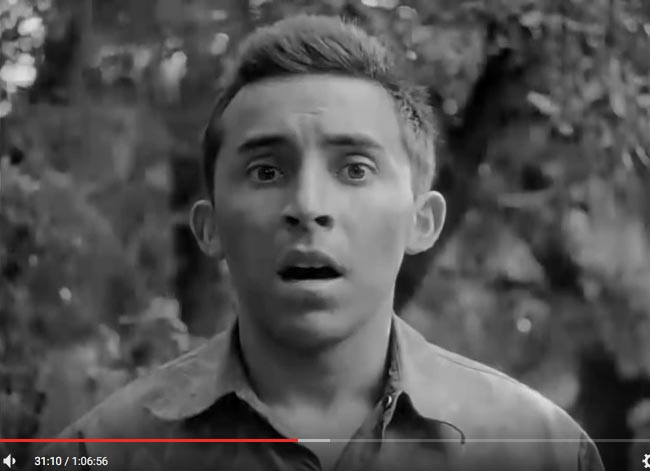
SIDNEY:
I stopped them from beating you. Don't scowl. Watch, I'll make you laugh. Look, I'm the General.
Sidney sits on the ground and playacts for her, gesturing the fullness of his rotund belly.
330 MCU of Sidney pretending to gorge himself on food. Discordant music plays throughout.
331 CU the woman watching.
332 Sidney continues his pantomime, pretending to eat corn.
333 MCU of the woman from the side, dejected, head down.
SIDNEY (off screen): Hey! Hey, watch me!
334 LS from behind of the woman bound to the tree, Sidney beyond.
SIDNEY:
Attention! The General is here! Attention! Glad to have you with us, Sir. Quite frankly, the situation is desperate. I don't think I can cope with it alone.
335 MCU Sidney.
SIDNEY:
Isn't it funny? Isn't it? Orderly, more fat fish that the woman caught for me. The General, I am the General.
He rises.
336 LS from behind of the woman bound to the tree, Sidney standing before her.
337 Shot as in 333 of the woman from the side, downcast.
338 As shot 336.
SIDNEY:
You don't even smile. What do you want? Listen. I'm lost, lost on this terrible island.
339 CU of the woman.
340 MS of Sidney's knee thrusting between her legs.
341 MCU of Sidney embracing the woman.
SIDNEY:
If you have to hate me, please, try to like me also.
342 MS Corby, Fletcher and Mac back by the raft. We hear the water.
343 MS to LS facing Mac, Fletcher and Corby standing before the raft, the river beyond.
344 LS the landscape out upon which they are looking.
CORBY:
They must have been reading a magazine in that plane.
345 Shot the same as 343.
346 Another view of the river.
FLETCHER:
I wouldn't have believed it.
347 Shot same as 345.
CORBY (taking out his binoculars): Mac, you better take a look
around the river bend.
348 LS of Mac and Fletcher from beyond Corby.
CORBY (handing the binoculars to Mac):
Be careful.
349 MS of Fletcher, Mac and Corby, facing the river.
CORBY:
We'll get to work...
350 LS Corby and Fletcher beginning to work on the raft, Mac walking off.
CORBY: ...camouflaging the raft.
Fletcher and Corby then approach the camera and Fletcher takes out his knife.
351 CU Corby, the river beyond.
CORBY:
I'm a little worried about Sidney back there with the woman.
352 MS Fletcher, from behind Corby's shoulder.
CORBY:
I don't like the way he's been acting.
FLETCHER:
You're not going softheaded and thinking about taking her along with us tonight?
353 CU Corby as in shot 351.
CORBY:
You're beginning to sound like Sidney. No. If she could bring three friends....
354 CU Fletcher.
CORBY (off screen): ...perhaps.
But as it is, she'll remain locked in the forest, like we were.
355 MS Mac from behind, approaching the river. He takes out his binoculars.
356 MCU from side of Mac looking through the binoculars.
357 Through the binoculars, an airplane.
MAC (thinking): That must be the one that almost nailed us.
The binoculars pan screen right.
358 MS as 356.
359 The General on the porch, through the binoculars.
MAC: There he is again. It's him! The cocky little king.
360 CU Mac looking through binoculars.
MAC:
And me holding binoculars like a lady watching...
361 As in shot 359.
MAC: ...an opera. Binoculars! Soon he'll go into his palace with all his iron lap dogs. If only this was a rifle sight, then I could make the red eye between his ears.

362 CU of Mac as in shot 360.
MAC:
Then he'd see McClellan!
363 LS of Mac on the riverbank, as in shot 355. He turns and comes back up the hill.
364 Extreme CU of Sidney.
SIDNEY (thinking): Women always love stories,
but it's so hard to finish and wait for words.
He turns and walks toward the woman who comes into focus in the background.
SIDNEY:
You wanna hear more?
365 CU of the woman.
SIDNEY:
Do you? Huh? Alright.
366 MS of the woman from the side, Sidney just beyond and facing the camera.
SIDNEY:
Then the spirit in the magician's power goes back to the island and tells Miranda that her father's dead. The spirit sings how he's dead at the bottom of the ocean. His bones are coral, his eyes are pearls, and Miranda, her father's dead. Dead! Can't you understand anything? Dead! Dead! Dead! Now d'you understand?
367 LS of Mac walking.
368 MS Fletcher and Corby laying branches on the raft.
369 Shot as in 367. He removes the binoculars.
CORBY (off screen): All clear?
370 Shot as in 368 of Fletcher and Corby. Mac enters from screen left and hands the binoculars to Corby.
MAC:
Everything's alright.
371 CU of Corby.
372 MS of Mac from over Corby's shoulder.
MAC:
I'd like to talk to you about that house.
CORBY: What house?
MAC:
That house down there. The one where we saw that General yesterday.
CORBY: Later on, Mac. Right now I'd like you to go back to Sidney. I didn't like the way he was acting when we left and I'm a little concerned.
MAC: But don't you think...
CORBY: Do as I say, will you? As soon as we're through here we'll join you. I don't want anything to go wrong back there.
373 Shot of the woman from the side.
374 CU of the womans tied hands.
375 CU from the font of the woman. She turns her head to the right.
376 MLS of Sidney approaching with cupped hands.
SIDNEY:
Here, I brought you some water.
She drinks out of his cupped hands.
377 CU from the woman's left, she looking up at him.
378 CU of Sidney, he looking down at her, smiling, then raising his eyes and giving a strange look at the camera.
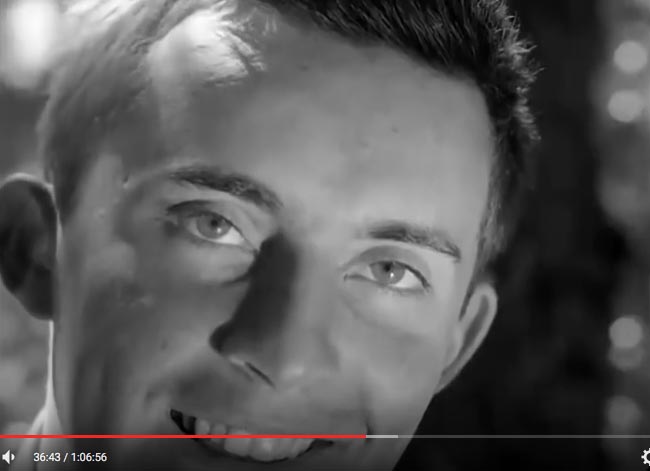
379 CU of the woman. She smiles.
380 MS of Sidney from behind the woman, smiling at her.
381 CU She licks his hand (like a dog).
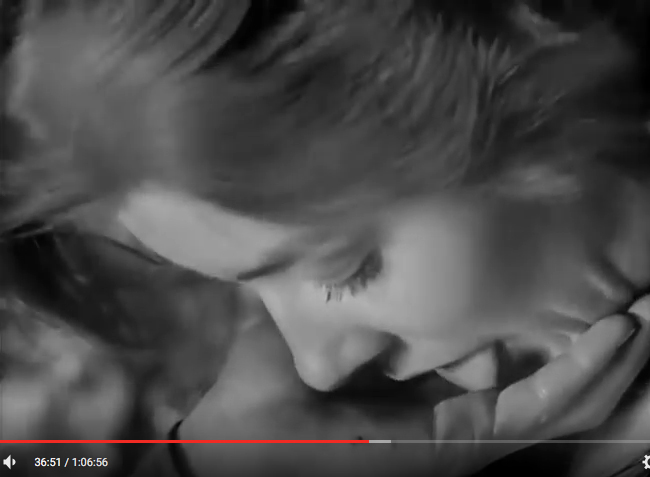
382 MS as in 380, Sidney closing his eyes as if in ecstacy.
383 MS of Mac walking through the forest.
384 Shot as in 382, Sidney embracing the woman's face with his hands.
SIDNEY:
Now you like me...
385 CU of woman's face, Sidney's hands on it.

SIDNEY: Don't you?
386 CU The woman's hands working the belt.
387 MS Sidney from behind the woman, embracing her face as in shot 384. He kisses her neck.
388 CU of the woman's face.
389 LS Fletcher and Corby finish covering the raft with branches.
390 MS from the side of Sidney embracing the woman, kissing her forehead, stroking her hair.
391 MS of Corby and Fletcher walking through the woods.
392 CU of the woman from behind Sidney as he embraces her.
393 CU of the woman's hands and Sidney grasping the belt that binds them.
394 MS of the woman from behind Sidney, he continuing to embrace her. Her expression is expectant of her release.
395 CU of the woman's hands as in shot 393, Sidney working the belt buckle.
396 MS of the woman from behind Sidney as in shot 394, satisfaction on her face as she nears being released.
397 LS Mac walking through the woods.
398 CU Side shot of the woman and Sidney.
SIDNEY:
I'll get you loose. Just a minute. You'll put your arms around me. I know. Wait. I knew you'd like me. Just a minute.
399 CU of the woman's face.
400 CU of Sidney working the belt buckle.
401 CU of Sidney's face.
402 LS of Fletcher and Corby walking through the woods.
403 MS of the woman, Sidney behind her working on the belt, nuzzling her neck.
404 CU as of 400 of Sidney working the belt.
405 CU of the woman's face.
406 CU of Sidney's face, expectant, leering.
407 CU continue Sidney's working the belt. She is released.
408 MS from the front as she immediately begins to run away, the belt still attached to her right wrist.
409 MCU of Sidney trying to hold onto the belt then falling.
410 MS of Sidney still holding onto the belt.
SIDNEY:
Don't run away! Don't make me stay!
411 MS of the woman working to release her wrist from the belt.
SIDNEY (off screen):
You're going to tell the General!
412 MCU of Sidney on the ground.
413 MS of the woman as shot 411, releasing her wrist.
SIDNEY:
You're gonna tell him I made fun of him!
414 MS of Sidney and the woman passing between him and the camera as she runs.
415 MS of the woman running.
SIDNEY:
Come back!
416 MS from the side of Sidney as he unholsters the gun.
SIDNEY: Don't tell the General!
417 MLS of the woman running from behind.
418 MS of Sidney as in shot 416.
SIDNEY:
I won't hurt you!
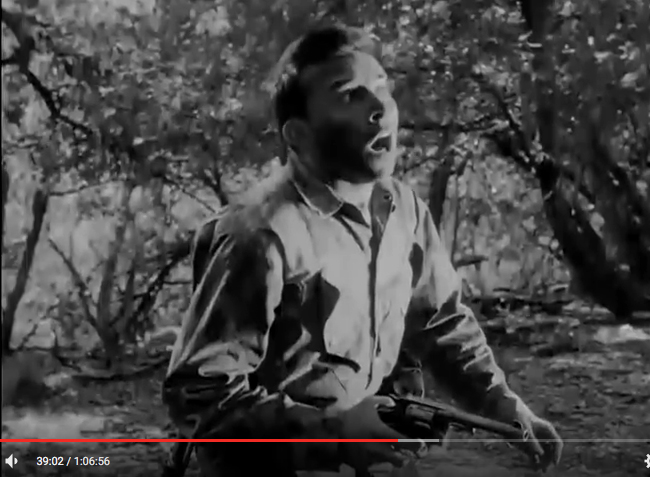
419 Very rapid CU of Sidney.
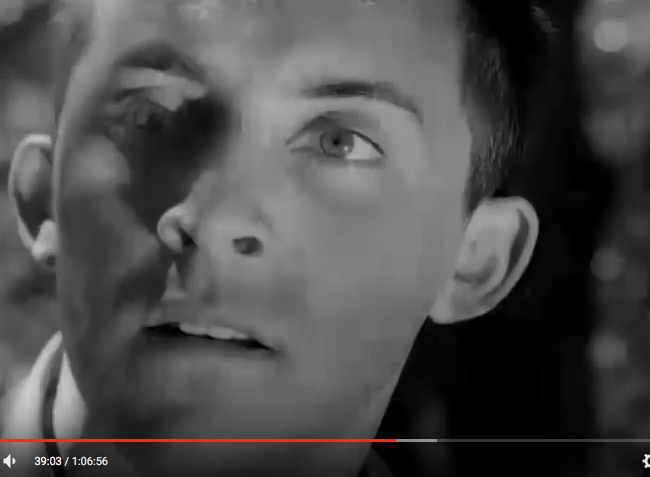
420 CU of Sidney's face in shadow.
421 Same rapid CU as of 419.

422 Same rapid CU of his face in shadow as of 420, fading into...

423 Same rapid CU as of 421.

424 Extremely quick CU of face in shadow as of 422.

425 Extremely quick CU of face as in 423.

426 MS of Sidney as in shot 418 with the gun drawn. He fires it 3 times.
427 CU of Mac, startled by gun shots as they continue.
428 CU of Fletcher, Corby behind him, listening to the shots.
429 CU of the woman's face on the ground. Silence
430 MS of Sidney sinking to the ground.
431 CU of the woman's face on the ground flipped from shot 429. Sound of artillery in the distance.
432 CU of Sidney lying with his face on the ground, eyes closed.
433 Same shot as 431 of the woman's face facing the top of the screen.
SIDNEY: Blood, blood. No one. She's...
434 CU of the woman's hand.
SIDNEY (off screen): She's broken with blood.
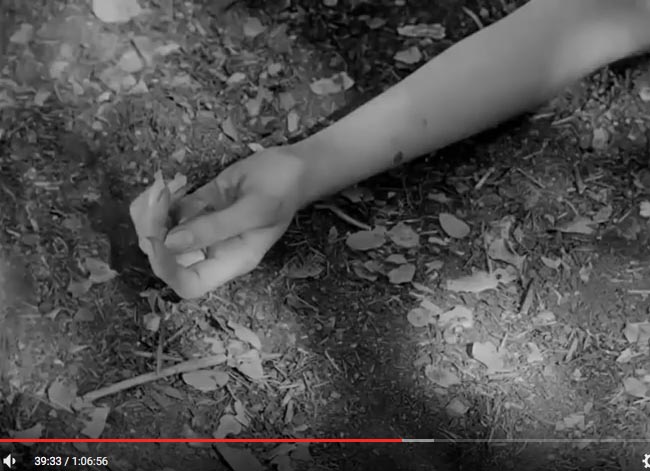
435 MS Sidney lying on the ground, the pistol beside him.
436 CU of Sidney's face, he lying on the earth. He raises himself, hearing Mac.
437 LS of Mac coming up a hill.
438 CU of Sidney as in 436.
439 LS Mac continuing toward the camera through the forest.
440 CU of Sidney as in 438.
441 MS Sidney from the side, lying on the ground, raises himself as Mac approaches.
MAC:
What's the matter? Where's the woman? Answer me! What have you done? Tell me or I'll pulp you to a jelly!
He pulls Sidney to his feet.
SIDNEY: She was tired. She went to lie down. Over there.
442 CU Sidney.
SIDNEY: Don't annoy her, Mac. Come here.
443 MS of the woman from the side. Mac's feet as he approaches.
444 CU of the woman.
445 CU of Mac.
446 MS of Sidney.
447 CU of the woman, reversed.
448 MS The woman on the ground, Mac kneeling over her.
449 CU Mac as in shot 445. He puts his hand up to the camera.
450 MS of Mac and the woman as in shot 448. Mac touches her shoulder then draws back.
451 CU of Mac looking back over his shoulder at Sidney.
452 MS of Sidney as in 446.
SIDNEY: It wasn't my fault! The magician did it. Honest! Prospero the Magician!
453 CU of Mac as in shot 451.
SIDNEY (off screen): First we're a bird...
454 MS as in shot 450. Mac rises.
SIDNEY: And then we're an island.
455 MS of Sidney as in 452. Snaps his fingers.
456 CU of Sidney.
SIDNEY: Before I was a general, and now I'm a fish! Hoorah for the magicians!
457 MS of Sidney turning and running downhill.
458 MS from the side of Sidney running. He stops and points at the river.
SIDNEY: The river. It's blood, Mac! Cold.
459 CU of Mac.
460 MCU of Sidney.
SIDNEY: I'm going for a swim. Come on in, Mac! Listen to them. (He laughs.) It's blood!
Roaring with laughter he runs down to the river.
461 CU of Mac staring after him.
462 LS of Fletcher and Corby coming up over a hill.
463 Mac as in shot 461.
464 MS from side of Fletcher and Corby running up to Mac.
465 MCU of Mac from over Corby's shoulder, Fletcher standing between.
CORBY: What happened? Where's Sidney and the woman?
MAC: The kid must have gone out of his head. When I got back, he was just laying there. The woman's dead. Over there.
466 MS of the woman.
MAC: He shot her.
FLETCHER: Where is he?
467 MS of Corby, Fletcher and Mac as in shot 464.
MAC: He's gone. He yelled something about how the magician does it.
Before he was something and now he's a fish. Before I could stop him he ran away towards the river.
468 LS of the river, dust rising from where Sidney ran down.
469 MS of Corby from over Mac's shoulder.
MAC: He kept laughing and...
470 MS of Corby, Fletcher and Mac as in shot 467.
MAC: ...screaming.
FLETCHER: We can't do anything about it now.
471 as in shot 469.
FLETCHER (off screen):
Let's move again. A nice spot by the raft will be the best way to wait 'til night.
472 CU of Mac.
473 As in shot 471.
FLETCHER:
I guess there's gonna be more elbow room than I thought.
474 CU of Mac.
MAC:
Yeah. And I wanna talk to you about that house down the river, and the General.
Fade to black.
THE WOMAN KILLED BY SIDNEY: THINGS TO NOTE
The bulk of what I have to say about the killing of the woman I've already written about in The Tempest, Chess, and HAL's Error.
But I've some additional things upon which to comment.
Sidney as Ariel and his fear of being left behind
Though Sidney's fear of abandonment is due his reluctance to partake in the raid the previous night (Corby briefly holding a gun on him) and perhaps his fear of being seen as uncooperative, as he is left with the bound woman, I'm reminded of the story of Ariel's background in The Tempest, how he had been bewitched by Caliban's mother and imprisoned in a tree for 12 years, during which time she died, and was released by Prospero when he arrived at the island. Prospero holds this experience over Ariel's head. When Ariel protests doing Prospero's bidding, Prospero calls him a malignant thing, reminds him of his imprisonment and threatens him with being imprisoned yet again for twelve years if he even murmurs against him.
The death of the woman and its similarity to the deaths of the three soldiers the previous night
The death of the woman reminds very much of the three deaths in the cabin the night before, which Sidney had playacted for her in his own way, and in so doing certainly gave her every reason to fear he would choke her. As with the men slain the previous night, she lies upon the ground with eyes still open, appearing mannequin-like. To our eyes she is dead. But when Mac passes his hand over her eyes we view this from as if her perspective and have a sense of some kind of animation there, of something watching that hand, aware of it. With our perceiving Mac passing his hand before her eyes, the very alive audience also sees from her perspective, from the position of the dead woman. Kubrick hopes to have us have a more active experience in the film by doing this, our taking the place of the woman. Though she appears dead, Sidney will insist she is only sleeping. This is, on one level, his madness. But it is also a recurring theme of Kubrick's, the audience participating in the film as in a dream.
Metamorphosis, illusion, and why Sidney denies responsibility for the woman's death, instead asserting the magician, Prospero, is in control
We clearly saw the woman shot with Corby's gun, Sidney pulling the trigger. But Sidney instead claims she is only sleeping and begs Mac not to disturb her. The movie is here referring to how Prospero manipulates everyone with illusions that they believe to be real, even his own daughter. When she sees the supposed wreck of the ship at the beginning of the play, she does not know it is magic. Nor do those who were on the ship know the wreck is an illusion, magic, theater. All suppose the ship is wrecked when it is not, and all suppose their mates are drowned, when they are instead all safe. The survivors of the shipwreck are amazed at their clothing, undisturbed by the water of the ocean, but are powerless to explore the reason why and dismiss it. Alonso thinks his son is dead. Ferdinand thinks his father is dead.
Prospero does tell Miranda that everything is all right, no one on the ship has died, then relates the true history of their exile of which she'd been unaware. After this, he puts her to sleep so she will not be aware of his magical machinations. That he does put her to sleep is also disturbing, for this is also a covert manipulation and she has no idea of it.
Thou art inclined to sleep; 'tis a good dulness,
And give it way: I know thou canst not choose.
Prospero claims to practice only good magic, and that it was Caliban's mother, the sorceress, who practiced the dark arts. Yet Prospero manipulates the minds of others, their understanding of their environment, and even their physical bodies.
Sidney claims that the magician, Prospero, is the cause of the woman's "sleep", which connects back with Corby through the vehicle of his gun. It was Corby, after all, who despite not trusting Sidney, who despite worrying about Sidney's mental condition, gives him not only the responsibility of looking after the woman, but provides him the gun with which she's shot. Corby's gun.
We are returned to Prospero's use of Ariel especially to carry out his magical bidding. The seeming wreck of the ship is Ariel's work. When Prospero puts Miranda to sleep, it is so that he can further instruct Ariel on what he is to do.
Go make thyself like a nymph o' the sea:
be subject
To no sight but thine and mine, invisible
To every eyeball else. Go take this shape
And hither come in't: go, hence with diligence!
Increasingly, Sidney has become aligned with Ariel and is certainly so here. Just as Ariel does Prospero's bidding, Sidney is virtually exclaiming that he has done Corby's bidding in killing the woman, only he phrases it as the woman having been only caused to rest by the magician. Then, like Ariel, he vanishes into the water. Ariel is in evidence throughout The Tempest, but Sidney will not be seen again until near the film's end, when the enemy General and Captain are dead and Corby and Fletcher have escaped enemy territory. After this, Sidney finally again becomes visible. And when he returns, it is in the water, he walking through it toward Mac on his raft.
The woman, free will, Comus, and the error that requires the calling upon Sabrina as a goddess who holds the power of reversals
With the enslavement of Ariel, and Sidney denying his responsibility for shooting the woman, reflection on the capacity of free will is not irrelevant.
The passage of The Tempest that Sidney rephrases for the woman, telling her the story of the drowned man turned to coral, contains in it the lines,
Full fathom five thy father lies;
Of his bones are coral made;
Those are pearls that were his eyes:
Nothing of him that doth fade,
But doth suffer a sea-change
Into something rich and strange.
Part of this passage will be related verbatim at the end of the film, by Sidney, whereas here he only paraphrases. A most significant line is the sea-change. John Milton is considered as referring to it in his 1634 masque Comus, which tells the story of Sabrina, a virgin who was either thrown into a river or flung herself into it due to the wrath of a vengeful stepmother, but perhaps in whom we can also see earlier myths of women who escape rape by undergoing protean shifts in aspect.
Water-Nymphs save Sabrina by transforming her into a new thing.
Bearing her straight to aged Nereus' hall; Who, piteous of her woes, reared her lank head, And gave her to his daughters to imbathe In nectared lavers strewed with asphodil, And through the porch and inlet of each sense Dropt in ambrosial oils, till she revived. And underwent a quick immortal change, Made Goddess of the river.
Through this quick immortal change (the sea change), Sabrina becomes a goddess. What's interesting is that she is the only one with power, in the Milton play, to defeat the sorcery of Comus, a Dionysian being of excess who is often depicted as passed-out drunk. Though the etymology of "coma" is unknown, it's not far-fetched to see how Comus would at least be poetically attached to the idea of the false sleep of the "coma". Milton certainly has this in mind, for in the play Comus has bound, with his magic, a lady of virtue in an enchanted chair so that she is unable to move. He strives to have her abandon her virtue. He taunts her that he has the power to chain her in alabaster, and she protests that he can still "not touch the freedom of my mind". When he is unable to convince her, he tries to make her drink a potion that would alter her temperament if she will not willingly change, at which point her brothers rush in to save her. Which is where Sabrina comes in, for the brothers make an error, and a spirit arrives who informs them of that error and how they can yet save their sister.
What! have you let the false Enchanter scape?
O ye mistook; ye should have snatched his wand,
And bound him fast. Without his rod reversed,
And backward mutters of dissevering power,
We cannot free the Lady that sits here
In stony fetters fixed and motionless.
Yet stay: be not disturbed; now I bethink me,
Some other means I have which may be used,
Which once of Meliboeus old I learnt,
The soothest Shepherd that ere piped on plains.
There is a gentle Nymph not far from hence,
That with moist curb sways the smooth Severn stream:
Sabrina is her name:
Their error is that they've not taken Comus' wand, bound him fast, and used his wand reversed, reciting Comus' spells backwards, to free the woman.
So Sabrina is called upon as for some reason she is the only one who can save the woman from her locked state, which must be compared with a coma. And why might this be except for her holding the power of reflection through her affiliation with water. They need, after all, to reverse Comus' spell, and if Sabrina is capable it is through her own powers of reversal.
This error, I think, is critical to Kubrick's work, for I've noticed with cross-analysis that he will sometimes have an implanted error. I don't mean such as the rearrangement of furniture, or settings changing, interiors not lining up with exteriors. No, I mean an error, such as we have with Sidney being in error in the story of Miranda and Ariel, which is corrected at the end of the film.
Shakespeare's Prospero and his sorcery have something akin with Milton's Comus, both binding people so they are unable to move, deranging their minds, putting them to sleep.
In Eyes Wide Shut at the end of the film, in the toy store, after we've observed The Magic Circle game, Helena points out to her parents a doll carriage and states she can put Sabrina in it. This mention of Sabrina occurs quite out of the blue, and I wonder if Kubrick is referring to the entry of the goddess Sabrina who is the one able to release the dreamers (the audience) from the spell that holds them fast.
Theater, the illusory, and magic
Shakespeare's refusal to kill a person and keep them dead in The Tempest, the revealing of all his illusions, is taken as a commentary on theater and the relationship of the thing staged to the audience--what is staged is both illusion and real, though a story, and the audience members are both observers and participants. But it is also a gnostic proposal. The world as maya. Illusion.
Our revels now are ended. These our actors,
As I foretold you, were all spirits and
Are melted into air, into thin air:
And, like the baseless fabric of this vision,
The cloud-capp'd towers, the gorgeous palaces,
The solemn temples, the great globe itself,
Ye all which it inherit, shall dissolve
And, like this insubstantial pageant faded,
Leave not a rack behind. We are such stuff
As dreams are made on, and our little life
Is rounded with a sleep.
As Sidney runs down to the river (once fightened of water, unable to swim, once frightened of blood, but will now immerse himself in it) he cries out that he has been a bird, an island, a general, and now a fish. "Hoorah for the magicians!"
The artist as magician. The director as a magician.
Life as magic.
Sidney's tale of metamorphosis and the story of Taliesin
Kubrick and Sackler appear to bring in the tale of the bard, Taliesin, who as a youth went by the name Gwion Bach. He is one who inadvertently received the gift of wisdom from a potion concocted by the sorceress, Ceridwen, and flees her in numerous forms as a shapeshifter. After being consumed by Ceridwen in the form of a "grain of corn", he was reborn as Taliesin and discovered in a leather bag in an otherwise empty fishnet. The story is similar to that of the Salmon of Knowledge and the wisdom it brought the Fionn mac Cumaill.
The poems ascribed to Taliesin have been called the romance of metempsychosis. "The Druidical doctrine of the transmigration of souls is thought to be hidden in the poet's account of his wonderful transformations." A specimen or two out of many such may be quoted. --
I have been a multitude of shapes
Before I assumed a consistent form,
I have been a sword narrow, variegated,
I have been a tear in the air;
I have been the dullest of stars,
I have been a word among letters,
I have been a book in the origin.
And again--
I have been a sow, I have been a buck,
I have been a sage, I have been a snout,
I have been a horn, I have been a wild sow,
I have been a shout in battle.
Source: The Celtic Magazine, 1884, Volume 9
The story of Taliesin's being fished out of a net is this.
Now there was at that time in Gwynedd, a lord named Gwyddno Garanhir, who had a son, Elphin, that was reckoned the most unlucky man alive. There was a weir on Gwyddno's land that had always had a huge catch of salmon in it on May Eve, so Gwyddno resolved to let Elphin have it to help turn his luck.
So it was that on May Eve, Elphin and two of his father's men went to the weir. Net after net he pulled, but there were no fish.
"Why, you've turned the luck of the weir," they growled. "Just wait," said Elphin, "I haven't finished yet. There might still be something..." There were no fish. But just as they were about to go, Elphin noticed something caught on a pole of the weir. He waded out and brought it back.
Source: Poetry attributed to Taliesin as adapted in "The Tale of Taliesin" by Jennifer Cochrane, at Encyclopedia Mythica
To turn the luck of the weir is a play on etymology. Weir (dam, fence) comes from "wer", a Proto-Indo-European root forming words meaning "to turn, bend", such as the Latin "ertere", or versus.
The leather bag was inside and inside that was a child with a shining white forehead, tal iesin, or "radiant brow". As they rode home the baby spoke and told his story.
"Firstly I was formed in the shape of a handsome man,
in the hall of Ceridwen in order to be refined.
Although small and modest in my behavior,
I was great in her lofty sanctuary.
"While I was held prisoner, sweet inspiration educated me
and laws were imparted to me in a speech which had no words;
but I had to flee from the angry, terrible hag
whose outcry was terrifying.
"Since then I have fled in the shape of a crow,
since then I have fled as a speedy frog,
since then I have fled with rage in my chains,
- a roe-buck in a dense thicket.
"I have fled in the shape of a raven of prophetic speech,
in the shape of a satirizing fox,
in the shape of a sure swift,
in the shape of a squirrel vainly hiding.
"I have fled in the shape of a red deer,
in the shape of iron in a fierce fire,
in the shape of a sword sowing death and disaster,
in the shape of a bull, relentlessly struggling.
"I have fled in the shape of a bristly boar in a ravine,
in the shape of a grain of wheat.
I have been taken by the talons of a bird of prey
which increased until it took the size of a foal.
"Floating like a boat in its waters,
I was thrown into a dark bag,
and on an endless sea, I was set adrift.
"Just as I was suffocating, I had a happy omen,
and the master of the Heavens brought me to liberty."
Source: Poetry attributed to Taliesin as adapted in "The Tale of Taliesin" by Jennifer Cochrane, at Encyclopedia Mythica
Kubrick has here put together themes that he later repeatedly uses in his work: doubles (I include in the idea of the double, the reversals and flipping of imagery), and cyclings of events that occur in the form of metempsychosis or something very similar to it, such as in in A Clockwork Orange when Alex, as a virtually reborn person, returns to old scenes where he must experience them again in his new form, and the example of Jack in The Shining who at end is represented as being an example of perhaps a transmigration of soul, or less personal spirit, such as the errant, evil thinking that lingers in the lodge as all its history accumulates.
Metamorphosis, the mystery of what's in the woman's hand, and its relationship to what's in Jack's hand in The Shining
Cyclical repetitions of events, often with some metamorphosis, are central to most of Kubrick's films, such as in The Shining with Jack's deja vu concerning the lodge. And, considering this, we should take note of a couple of important images in this film that speak to this recycling of knowledge and event.
First, we should look back at the scene concerning the dog.
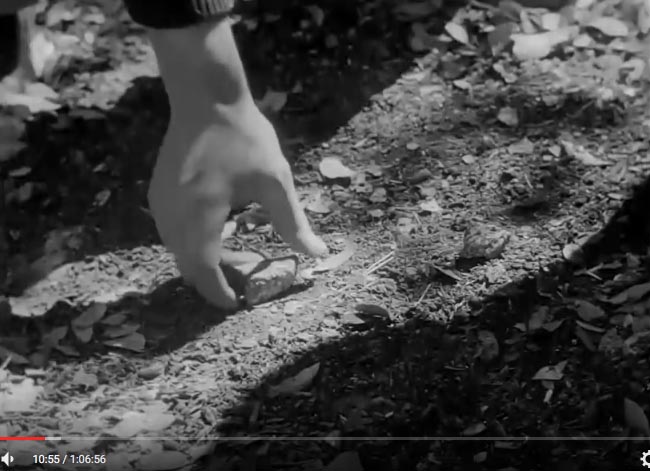
Corby throws a stone and the dog, which had befriended Sidney, gives chase.
Now, let's take a look at the death of the woman who had been guarded then shot by Sidney. He had given her water to drink and she had lapped it much in the way a dog laps water.
Kubrick presents her in a "normal" shot.
Then Kubrick presents that shot flipped (turned 180 degrees).
After this he gives a curious shot of her hand, and we see that she holds something white in it, which she had not been holding when she was released from her bonds.

Not a stone? It's impossible to tell what she holds, but it should perhaps remind of the stone thrown for the dog. It also should perhaps remind of the emphatic CU of the soldier's hand, as he died, closing upon the stew and potatoes then relaxing open in death. These soldiers, in death, were also shown in reverse (flipped horizontal) shots. These hands holding someting in death are certainly related.
One may be reminded of the following image from The Shining, the big reveal at the end when Jack is shown holding something against the palm of his right hand.
The potatoes in the soldier's hand don't have the same level of mystery. We know what the dead soldier holds. We don't know what it is that Jack holds, which he wants us to see, the significance of which is unrevealed. We have only the mystery. The question. The evidence of something that was undisclosed until a critical point and will be unexplained.
We don't know what the woman holds or how it came to be in her hand, but Corby had earlier thrown the stone for the dog, and it's difficult to be rid of the feeling it might have to do with that stone.
Now, you just don't go around leaving unidentified objects in the palms of your characters without people questioning, "What the hell is that and what might it tell us if we knew what it was?" That little something in Jack's hand, and Jack's appearance in the old photo, coupled with the stories that he has always been the caretaker, returned many people to the theater hoping to discover what was going on and what in the world he was holding.
Which is partly the point. That little slip of something in his hand is coupled with the audience being presented an image that makes them feel they've missed a piece of the puzzle, so they will return and watch the movie again in an attempt to sort out the puzzle, to see what they missed, and will themselves become active participants of the deja vu that Jack felt in the film. They re-experience but their view has changed. They experience the old exactly as it was, the film does not change, but they experience it anew and their perception changes as what they are looking for in the film changes.
What unifies the dog, the soldiers, and the girl, is that they are all "other", or alien, to Corby who threw the stone. The reason he threw the stone for the dog was they couldn't use a mascot. As the dog trotted away after the stone, he started everyone for the river, saying that more animals might show up.
The word mascot derives from the French mascotte, which is a sorcerer's charm or fairy friend, a thing that brings good luck, an enchantment, from masco, witch, and there from perhaps masca, the Latin for mask, a specter, a nightmare. A false face.
We can look on the stone as having been caught in hand by the soldiers who are killed, in the form of a potato. That is a false face. Then it appears in the hand of the woman who is killed. Her face, too, must be false, if only in the sense of how Sidney describes himself as he runs off to the river, that he has been this thing, and that, he has been many things, so that no face he has worn has been his own, instead it is a garment.
The dog, Proteus, and the protean nature of Kubrick's characters, settings and props. The Two Gentlemen of Verona and that play's relationship to the protean Sidney, and the question of one's true face
In Fear and Desire, on day three, we will learn--when we finally see the General up close, and thus find he is an elder double of Corby, and his Captain is a double of Fletcher--that the dog is indeed the General's, and its name is Proteus. Which is what? It was the name of a god of the sea who was a shapeshifter and inclined to prophesy, for which reason we have protean which means "changeable in shape or form".
Proteus knew all things--past, present, and future--but disliked divulging what he knew. Those who wished to consult him had first to surprise and bind him during his noonday slumber. Even when caught he would try to escape by assuming all sorts of shapes. But if his captor held him fast, the god at last returned to his proper shape, gave the wished-for answer, and plunged into the sea. The captor in Homer's version (Odyssey, Book IV) was Menelaus; in Virgil's telling (Georgics, Book IV) it was Aristaeus who tried to hold Proteus. Because Proteus could assume whatever shape he pleased, he came to be regarded by some as a symbol of the original matter from which the world was created. The word protean, one meaning of which is "changeable in shape or form," is derived from Proteus.
In a story first known from the work of the 6th-century-bce poet Stesichorus, Proteus was portrayed as an Egyptian king-either of Memphis (by Herodotus) or of all of Egypt (in Euripides' Helen)--who kept the real Helen safe in Egypt while Zeus sent Paris on his way to Troy with a phantom Helen.
Source: Encyclopaedia Britannica
The manner in which these ideas are being used in Fear and Desire doesn't incline to an easily traceable line. I will later discuss yet another Shakespeare play that is perhaps referenced in Fear and Desire and confirms Sidney as a Protean being, just as he declares himself to be here. (Or, at least the "mad" poet, just as was Taliesin a poet.) The dog we must take, by its name, as being Protean. The dog, though collared, runs free. Later it is unable to answer the queries of the general, just as the captured woman, having emerged from the river, answers nothing and is unable to dialogue in words, just as Proteus doesn't easily divulge prophetic knowledge. Sidney releases the woman from her bonds and she runs. So, she is killed and on the human level we have the painful story of her mistreatment and murder. But on another level, as Sidney insists, as does the script aver, we are dealing with Protean events, and the woman has simply eluded her captor. By ordinary eyes, Sidney is "mad", when instead his world view is alien to the empathies and confines of usual human intelligence.
The very nature of story and the ability to identify with its characters is to partake of a Protean sensibility, which may be intimated here with the continual breaking of the 4th wall so that the audience is placed in the position of the woman, such as when Mac examines her and passes his hand before her face, looking at us directly and his hand passing over our eyes.
Actually, while I'm going into this as deeply as I have, I may as well discuss now Shakespeare's play, The Two Gentlemen of Verona.
In that play we have a character by the name of Proteus who is in love with a woman named Julia. But when he follows his friend, Valentine, from Verona to Milan, he surprises himself by falling in love with another woman, Sylvia. In this way he is protean in love, forgetting his original affection, becoming as another person in another place. Sylvia is, however, in love with Valentine, but has been betrothed to marry another, so she flees the city for the forest where she is taken captive by outlaws (I will leave out the convoluted portion in which Valentine has become the head of the outlaws only she doesn't know this). Proteus rescues Sylvia from the outlaws, but she rejects his advances (just as the woman rejects Sidney's advances). He's unable to tolerate that a person he loves would not love him in return, and says he will force her.
...if the gentle spirit of moving words
Can no way change you to milder form,
I'll woo you like a soldier, at arms' end,
And love you 'gainst the nature of love,--force ye.
Valentine rebukes Proteus and reminds him of who he was. Proteus feels badly about what he's become, confounded by shame and guilt, at which point Julia comes forward and reveals herself, for she has been nearby in the disguise of a boy. Reminded of his love for Julia, becoming devoted to her again, Proteus reprimands humanity for its inconstancy.
That the gentleman are of Verona perhaps brings in Veronica, which means "she who brings victory" but during medieval times became attached to the idea of vera (true) eikon (image), so that the veil of Veronica was supposed to be the true image/portrait of Christ. When away from Verona, Proteus forgets himself and becomes as another. He is reminded of who he is, a gentleman of Verona, and remembers himself again.
Corby had earlier opined on looking for one's true name. With The Two Gentlemen of Verona, Proteus loses his true nature but is reminded of it.
The stone thrown for Proteus, the dog, reveals the protean nature of the soldiers who are killed, the woman who is killed, and the stone itself.
But nearly everyone seems to be, to some degree, protean. Sidney, as a form of Taliesin, is protean.
The character of Proteus, in The Two Gentlemen of Verona, can be compared with Sidney, in Fear and Desire, who attempts to seduce the woman, his primary tools being her captivity and the power he has over her as a soldier, his attempt to win her trust in speaking of how he kept his fellow soldiers from harming her, attempting to convince her he is the good guy, expecting her love in return.
Still, there is that layer of story in which he protests the "magician" is responsible for her murder, and when we consider Corby's leaving Sidney there with her, trusting him with his gun when he sensed he was unstable, that is also a coherent and plausible interpretation.
Fear and Desire is a youthful effort that tackles complex subjects with an eager but unrefined hand.
The question is not whether Kubrick is interested in protean nature and doubles. He is. They are expressly stated and developed in the film. No argument can be made against this. With his flipped shots in the cabin raid, the way he shoots them, and how we are unclear as to where we are positioned as an audience, unclear as to exactly how all the pieces of the men and the room and its doors fit together, we have a director who aims at disorientation. We have the same with the flipped shots of the woman. We see it also with the CU quick shots of Sidney before he shoots the woman, in which he is in shadow on screen left then in shadow on screen right. Again, we are disoriented as to what we are seeing, how the scene fits together, Sidney's orientation to the running woman. This is intentional. The story is muddled due to it. We view conflicting things that don't fit together. There is no hope of reconciliation of these disparities and conflicts unless they are recognized, and too often they are passed over as merely accidental instead of being part of Kubrick's very personal theory of cinema.
The magician? Throughout his works, Kubrick handled himself, the storyteller, as a magician, using powers of illusion and subjecting the audience to Protean influence.
Mac's speaking of the rifle sight and the red eye, its relationship to the mouse-trap and to 2001
I have written, in The Tempest, Chess, and Hal's Error, how we find already in Fear and Desire a presage of HAL of 2001. But we also have a more literal description in Mac's wishing he had a rifle sight "then I could make the red eye between his ears, then he'd see McClellan". I'm not saying we should look at HAL as a rifle sight, but the "red eye" that Mac describes, the reflexive property of sight, the relationship of observer and observed, is part of the mystery of HAL who is everywhere and nowhere at once, controlling yet physically absent, represented by the red eye of the camera. Even further back than Fear and Desire do we have the theme of the shining of a light in the eye, which is in most of Kubrick's films. We have it in The Day of the Fight with the examination of the boxer, a light shown in his eye by the doctor to see if he's fit to fight. We have it in Lolita, with a light shown in Humbert's eye by the doctor (not in the book) after Humbert pitches his fit upon finding Lolita has escaped. There's no reason for this to be done, yet it is. We have it in A Clockwork Orange with Alex's eyes pried open for the Ludovico therapy. Even in Eyes Wide Shut we have an eye exam poster in Bill's office, and the story of his helping a model get half of 5th avenue out of her eye. With the connection between the red eye and the rifle sight in Fear and Desire, we then also have it in The Killing with Nikki's shooting of the race horse which he follows with his rifle sight, and is a pivotal scene.
The audience is made most conscious of HAL's eye when Dave and Frank are discussing his possibly having made an error and what that would mean. With Humbert, he has faulted the hospital with their error of releasing Lolita to a supposed uncle. In A Clockwork Orange, the Ludovico treatment, supposedly fixing Alex's faults so he can't act on his impulses, gets a twist with Alex screaming out the fact they are using music in their treatment, which makes their treatment faulty in that he won't be able to enjoy Beethoven. In Eyes Wide Shut, the model who had half of Fifth Avenue removed from her eye by Bill is the one who points out that doctors work too hard and miss much, for which reason he will be taken to where the rainbow ends.
Mac is lamenting the fact that he currently views the general with binoculars, which is to see with two eyes and may have to do with Kubrick's use of doubles in all his films. He instead wants the single eye of the rifle sight, then he could make out "the red eye between" the general's ears. And there is an error also connected with this, but it is occurring with Sidney. As soon as McClellan speaks of the rifle sight and the red eye, Kubrick cuts back to Sidney telling the captive woman the story of Miranda and Ariel from The Tempest, only his story is in error. Then Kubrick cuts back again to Mac and Corby, and now Corby is suddenly concerned about Sidney and wants to get back. "I don't want anything to go wrong back there," says the man who gave Sidney the gun that will be used to kill the girl, something going very wrong indeed when Sidney is misquoting Shakespeare, and when Sidney, like HAL, is able to see from many different points of view due his morphing.
The mousetrap was a very forced analogy Corby applied to their situation, which is why I have returned to the idea of it several times. All Corby had to do was draw a line and said, "We crashed in enemy territory. Friendly territory is several miles over here." Then he could have drawn a bisecting line and said, "There's a river near us that we can follow back home." Because the mousetrap is so forced, I have to think that it was intended to represent Shakespeare's mousetrap as depicted in Hamlet, the play within the play, the pay that reveals a truth--which Kubrick did use elsewhere in his films, explicitly in Barry Lyndon with Lord Bullingdon putting his shoes on his little brother and acting out Barry's encounter with his father who had accused Barry of wanting to step into his own shoes. In the book, Thackeray states this episode is a play within a play. It is also why Barry becomes so enraged, for Kubrick has him left to deal with the guilt of his being near responsible for the elder Bullingdon's death. That guilt may not be overtly stated, but there are many things not overtly stated that increasingly weigh upon Barry throughout the film and contribute to his collapse with the death of his son.
Where we have, in this film, the play within the play is with Sidney's dialogue with the woman, which I explore in full, as stated previously, in Stanley Kubrick's Fear and Desire, The Tempest, Chess, and HAL's Error.
Examining the film in respect of The Tempest does not negate those layers of the story that speak to the horrors of war
Just to make it clear, examining the film's metaphors and symbols, its links to myth and The Tempest and other plays, does not deprive it of its other layers. We do find in the film a fairly straight-forward commentary on war, the military and class. We can see the woman as a civilian victim, as well as a victim of her gender and how the men relate to it, and Sidney as a victim as well, traumatized and suffering from PTSD. I will explore this a little more at the end of section three.
June 2014 but transferred in March 2016 to this form. Approx 11,720 words or 24 single-spaced pages. A 90 minute read at 130 wpm.

